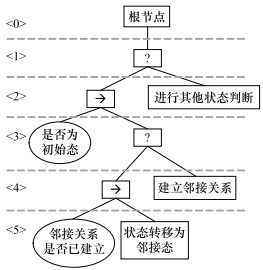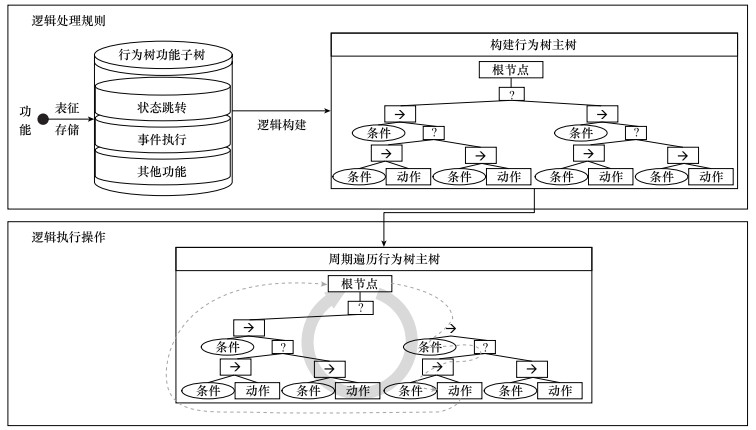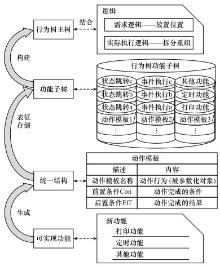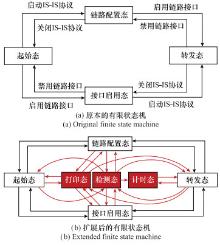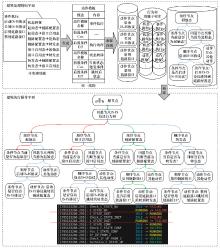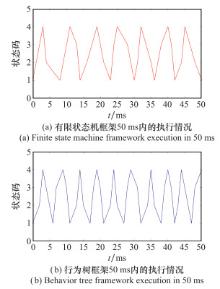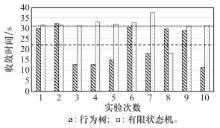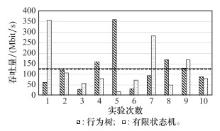Systems Engineering and Electronics ›› 2025, Vol. 47 ›› Issue (3): 997-1009.doi: 10.12305/j.issn.1001-506X.2025.03.32
• Communications and Networks • Previous Articles Next Articles
Decoupled control plane structure design for routing protocol with behavior tree
Lujia DONG1, Tao FENG2,*, Jiaorui HUANG3, Chungang YANG1,3
- 1. Hangzhou Institute of Technology, Xidian University, Hangzhou 311200, China
2. Institute of Systems Engineering, Academy of Military Sciences, Beijing 100039, China
3. School of Telecommunications Engineering, Xidian University, Xi'an 710071, China
-
Received:2024-01-24Online:2025-03-28Published:2025-04-18 -
Contact:Tao FENG
CLC Number:
Cite this article
Lujia DONG, Tao FENG, Jiaorui HUANG, Chungang YANG. Decoupled control plane structure design for routing protocol with behavior tree[J]. Systems Engineering and Electronics, 2025, 47(3): 997-1009.
share this article
| 1 | 黄兵, 谭斌, 罗鉴, 等. 面向业务和网络协同的未来IP网络架构演进[J]. 电信科学, 2021, 37 (10): 39- 46. |
| HUANG B , TAN B , LUO J , et al. Future IP network architecture evolution for service and network collaboration[J]. Telecommunications Science, 2021, 37 (10): 39- 46. | |
| 2 | 孙杰, 马雷明, 杨爱东, 等. 通算一体驱动的算力内生网络技术与应用[J]. 电信科学, 2023, 39 (8): 127- 135. |
| SUN J , MA L M , YANG A D , et al. Computing native network (CNN) technology and application driven by joint communication & computing (JC&C)[J]. Telecommunications Science, 2023, 39 (8): 127- 135. | |
| 3 | 冷常发, 杨春刚, 彭瑶. 意图驱动的自动驾驶网络技术[J]. 西安电子科技大学学报, 2022, 49 (4): 60- 70. |
| LENG C F , YANG C G , PENG Y . Internet-driven autonomous driving networking technology[J]. Journal of Xidian University, 2022, 49 (4): 60- 70. | |
| 4 | WANG Y X , ZHOU J H , FENG G , et al. Blockchain assisted federated learning for enabling network edge intelligence[J]. IEEE Network, 2022, 37 (1): 96- 102. |
| 5 | BASICEVIC I, POPOVIC M, VELIKIC I. Use of finite state machine based framework in implementation of communication protocols-a case study[C]//Proc. of the 6th Advanced International Conference on Telecommunications, 2010: 161-166. |
| 6 | WASEEM Q, WAN DIN W I S, AMINUDDIN A, et al. Software-defined networking (SDN): a review[C]//Proc. of the 5th International Conference on Information and Communications Technology, 2022: 30-35. |
| 7 |
IOVINO M , SCUKINS E , STYRUD J , et al. A survey of behavior trees in robotics and AI[J]. Robotics and Autonomous Systems, 2022, 154, 104096.
doi: 10.1016/j.robot.2022.104096 |
| 8 |
FOZILOV K , COLAN J , SEKIYAMA K , et al. Towards autonomous robotic minimally invasive surgery: a hybrid framework combining task-motion planning and dynamic behavior trees[J]. IEEE Access, 2023, 11, 91206- 91224.
doi: 10.1109/ACCESS.2023.3308619 |
| 9 | IOVINO M, STYRUD J, FALCO P, et al. A framework for learning behavior trees in collaborative robotic applications[C]//Proc. of the IEEE 19th International Conference on Automation Science and Engineering, 2023. |
| 10 | TULATHUM P, USAWALERTKAMOL B, RICARDEZ G A G, et al. Human-robot interaction system for non-expert users in convenience stores using behavior trees[C]//Proc. of the IEEE/SICE International Symposium on System Integration, 2022: 1072-1077. |
| 11 | WIJAYA D K, PRIHATMANTO A S, YUSUF R. Behavior tree of agents in multi-agent system on action video game[C]//Proc. of the International Conference on Electrical Engineering and Informatics, 2023. |
| 12 | RODRIGUES S, RAYAT H K, KURICHITHANAM R M, et al. Shriek: a role playing game using unreal engine 4 and behaviour trees[C]//Proc. of the 4th Biennial International Conference on Nascent Technologies in Engineering, 2021. |
| 13 | KEDALO A, ZYKOV A, ASLAM H, et al. Comparing behaviour tree and hierarchical task network planning methods for their impact on player experience[C]//Proc. of the IEEE Symposium Series on Computational Intelligence, 2023: 135-139. |
| 14 | 杨兵, 彭佳, 辛毅. 基于行为树的网电一体作战行动控制建模研究[J]. 火力与指挥控制, 2022, 47 (12): 98-102, 108. |
| YANG B , PENG J , XIN Y . Research on modeling of network-electric integrated combat control based on behavior tree[J]. Fire Control & Command Control, 2022, 47 (12): 98-102, 108. | |
| 15 | WANG U J, FANG W, LIN C, et al. Air-defense decision-making model of single ship CGF based on the theory of fuzzy mathematics and behavior tree[C]//Proc. of the 2nd International Conference on Information Technology and Computer Application, 2020: 755-759. |
| 16 | DE LA CRUZ P, PIATER J, SAVERIANO M. Reconfigurable behavior trees: towards an executive framework meeting high-level decision making and control layer features[C]//Proc. of the IEEE International Conference on Systems, Man, and Cybernetics, 2020: 1915-1922. |
| 17 | 赵志稳, 战荫伟. 虚拟会议中基于行为树的智能角色行为建模[J]. 现代电子技术, 2022, 45 (24): 171- 175. |
| ZHAO Z W , ZHAN M W . Intelligent characters behavior modeling based on behavior tree in virtual meeting[J]. Modern Electronics Technique, 2022, 45 (24): 171- 175. | |
| 18 | 史殿习, 苏雅倩文, 李宁, 等. 基于行为树调度的多无人机未知室内空间探索方法[J]. 计算机科学, 2022, 49 (S2): 83- 93. |
| SHI D X , SU Y Q W , LI N , et al. Muti-UAV cooperative exploring for large unknown indoor environment based on bahavior tree[J]. Computer Science, 2022, 49 (S2): 83- 93. | |
| 19 | FENG S, XI J Q, GONG C, et al. A collaborative decision making approach for multi-unmanned combat vehicles based on the behaviour tree[C]//Proc. of the 3rd International Confe-rence on Unmanned Systems, 2020: 395-400. |
| 20 | GAO X M, FENG T, DU J H, et al. An programmable control plane framework by using behavior tree[C]//Proc. of the 4th International Conference on Hot Information-Centric Networking, 2021: 74-80. |
| 21 | 杨蓉, 郑建立, 谢雅欣, 等. 基于BehaviorTree的医疗仪器通信协议解析平台设计[J]. 智能计算机与应用, 2023, 13 (9): 141-145, 152. |
| YANG R , ZHENG J L , XIE Y X , et al. Design of communication protocol analysis platform for medical instruments based on behavior tree[J]. Intelligent Computer and Applications, 2023, 13 (9): 141-145, 152. | |
| 22 |
宋睿涛, 高先明, 黄姣蕊, 等. 基于行为树的组网服务管控架构及调度方法[J]. 系统工程与电子技术, 2024, 46 (10): 3547- 3556.
doi: 10.12305/j.issn.1001-506X.2024.10.31 |
|
SONG R T , GAO X M , HUANG J R , et al. Behavior tree based management and control architecture and scheduling method for networking services[J]. Systems Engineering and Electronics, 2024, 46 (10): 3547- 3556.
doi: 10.12305/j.issn.1001-506X.2024.10.31 |
|
| 23 | 熊海军, 朱永利, 赵建利, 等. 基于行为树的协议建模方法及其应用研究[J]. 计算机应用研究, 2014, 31 (9): 2696-2699, 2710. |
| XIONG H J , ZHU Y L , ZHAO J L , et al. Research on protocol modelling method based on behavior trees and its application[J]. Application Research of Computers, 2014, 31 (9): 2696-2699, 2710. | |
| 24 | LI Z J , YIN X , WU J P . Use of global behavior tree for conformance testing of OSPF protocol LSDB synchronization[J]. Tsinghua Science and Technology, 2004, 9 (1): 9- 16. |
| 25 | GHZOULI R , BERGER T , JOHNSEN E B , et al. Behavior trees and state machines in robotics applications[J]. IEEE Trans.on Software Engineering, 2023, 49 (9): 4243- 4267. |
| 26 | BIGGAR O , ZAMANI M , SHAMES I . An expressiveness hie-rarchy of behavior trees and related architectures[J]. IEEE Robotics and Automation Letters, 2021, 6 (3): 5397- 5404. |
| 27 | BOJIC I, LIPIC T, KUSEK M, et al. Extending the JADE agent behaviour model with JBehaviourTrees framework[C]//Proc. of the Agent and Multi-Agent Systems: Technologies and Applications: 5th KES International Conference, 2011: 159-168. |
| 28 | COLLEDANCHISE M , OGREN P . Behavior trees in robotics and AI: an introduction[M]. Boca Raton: CRC Press, 2018: 208. |
| 29 | SAARISTO S. Implementation of IS-IS routing protocol for IP versions 4 and 6[D]. Tampere: Tampere University of Technology, 2002. |
| 30 | ISO/IEC 10589. Information technology—telecommunications and information exchange between systems—intermediate system to intermediate system intra-domain routeing information exchange protocol for use in conjunction with the protocol for providing the connectionless-mode network service (ISO 8473)[S]. Geneva: International Organization for Standardization, 2002. |
| 31 | RFC 1195. Use of OSI IS-IS for routing in TCP/IP and dual environments[S]. United States: Internet Engineering Task Force, 1990. |
| [1] | Ruitao SONG, Xianming GAO, Jiaorui HUANG, Chungang YANG, Tao HUANG, Yuanyuan LI. Behavior tree based management and control architecture and scheduling method for networking service [J]. Systems Engineering and Electronics, 2024, 46(10): 3547-3556. |
| [2] | Bowen YUAN, Dongbo LIU, Zhaopeng LIU, Yanan LI. Modeling method of operational plan based on improved behavior tree [J]. Systems Engineering and Electronics, 2023, 45(4): 1111-1120. |
| [3] | Xing BI, Chaojing TANG. Security analysis of TLS protocol implementations based on model checking [J]. Systems Engineering and Electronics, 2021, 43(3): 839-846. |
| [4] | BI Xing, TANG Chaojing. Security analysis of TLS implementations based on state machine learning algorithm [J]. Systems Engineering and Electronics, 2018, 40(12): 2810-2815. |
| [5] | ZHAO Hewei, LIANG Yong, YANG Xiuxia. Anti-input windup dynamic neural networks control for flexible hypersonic vehicles [J]. Systems Engineering and Electronics, 2017, 39(4): 854-865. |
| [6] | ZHANG Mengmeng, CHEN Honghui, LUO Aimin, LIU Junxian. #br# C4ISR system structure flexibility analysis based on dynamic adjustment [J]. Systems Engineering and Electronics, 2016, 38(3): 563-568. |
| [7] | MI Qiao-li,XU Ting-xue,MENG Lei. Flexible reconfiguration model of ship-borne gun support organization based on polychromatic hierarchical network [J]. Systems Engineering and Electronics, 2014, 36(10): 2000-2006. |
| [8] | YAO Li-hong, LI Jun-min. Design of impulsive hybrid controllers for a class of nonlinear hybrid systems [J]. Journal of Systems Engineering and Electronics, 2010, 32(8): 1732-1736. |
| [9] |
ZHANG Dai-yuan1,2.
Training algorithm for neural networks based on distributed parallel calculation [J]. Journal of Systems Engineering and Electronics, 2010, 32(2): 386-391. |
| Viewed | ||||||
|
Full text |
|
|||||
|
Abstract |
|
|||||

